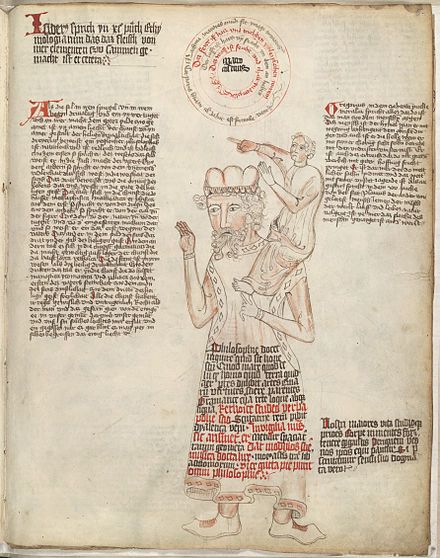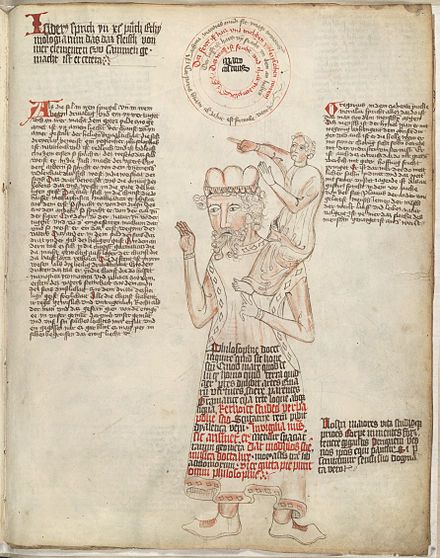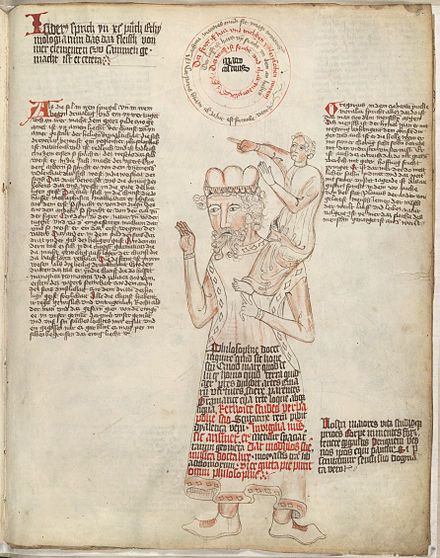Every Little Bit Helps

Shoulder Standing According to planksip and the Newtonian Inspiration from Chartres
In Chartres, the grand cathedral stood as a towering sentinel, its tall spires and intricate carvings dominating the skyline. Amidst this architectural marvel, Alaric, a small yet curious man, had found a peculiar perch on the carved giant overlooking the town.
From the giant's stone shoulders, Alaric enjoyed an unusual vantage point. The patchwork of rooftops, the distant hum of conversations, and the routine sounds of Chartre unfolded beneath him like a living tapestry. It was a perspective that transcended the ordinary, offering him a unique lens through which to view the ebb and flow of daily life.
Initially, the townspeople were puzzled by Alaric's chosen spot. Seeing him perched on the giant's shoulders sparked speculation and curiosity. However, as days turned into weeks, the town gradually accepted him as one of its peculiarities. Alaric, with his unassuming stature, became a fixture on the giant, symbolizing the connection between the ordinary and the extraordinary.
His presence atop the giant's shoulders became a silent commentary on the interplay of the mundane and the exceptional within Chartre. Going about their daily lives, the townspeople came to appreciate the subtle reminder that there was more to their existence than the routines of work and domesticity.
As the sun dipped low on the horizon, casting long shadows across the town, Alaric continued observing the changing hues of Chartre from his elevated perch. The grand cathedral, with the giant as its silent companion, stood as a beacon, bridging the gap between the town's history and its unfolding present.
In Chartres, where history whispered through the stones and the cathedral served as a silent witness, Alaric's perch on the giant's shoulders became a visual metaphor—a reminder that moments of extraordinary connection and insight existed even in the most ordinary towns.
A dwarf standing on the shoulders of a giant may see farther than a giant himself.
— Robert Burton (1577-1640)
Alaric often muttered these words, embodying that his unique viewpoint offered insights beyond his physical stature.
As the sun set, Alaric's silhouette against the fading light became a fixture, a living testament to the interplay of past and present. The silent and enduring giant stood as a guardian bridging the town's history.
With nightfall, Chartre's lights flickered on, casting a warm glow. Alaric, still on his perch, became a silhouette against the night sky—a guardian of wisdom and insight watching over the town in its slumber.
In the quiet town of Chartre, where history spoke softly through the cathedral's stones, the dwarf on the giant's shoulders symbolized a city embracing its past while reaching an uncertain future.
This age-old maxim had become Alaric's guiding principle, his raison d'être. He often spent his days perched on the giant's shoulders, gazing out over the town with a perspective that transcended the limitations of his physical stature.
As the sun dipped low on the horizon, casting long shadows across Chartre, Alaric contemplated the significance of his unique vantage point. The townspeople, initially bewildered by the sight of the dwarf and his silent companion, had come to accept this unusual spectacle as an integral part of their lives.
The giant, weathered by time, bore the weight of history on its stony shoulders. It symbolized the enduring spirit of humanity, an echo of the architects who, centuries ago, had dared to reach for the heavens by constructing the grand cathedral.
If I have seen further than others, it is by standing upon the shoulders of giants.
— Isaac Newton (1643-1727)
As Alaric continued to sit on the giant's shoulders, contemplating the world below, his mantra echoed in his mind. The truth embedded in those words transcended the physical realm, guiding him to seek understanding in the intricate web of life. Much like the cathedral's architects who aimed to construct a monument defying mortal constraints, Alaric yearned to unravel mysteries beyond the ordinary.
One crisp morning, as the town of Chartres stirred to life, a group of mathematicians arrived. Intrigued by the tales circulating about the dwarf and his perch on the giant, they ascended the worn cathedral steps, eager to experience Alaric's unique perspective.
Greeted by the sight of Alaric on the giant's shoulders, the mathematicians exchanged glances before joining him. The tableau that unfolded was peculiar yet captivating—a congregation of seekers standing not only on each other's shoulders but also on the shoulders of centuries of mathematical inquiry.
The mathematicians, usually confined to the rigid world of formulas and equations, found a new perspective in the open air atop the cathedral. Discussions flowed freely as ideas bounced between them, each contribution building upon the others, creating a mathematical symphony amidst the stones and spires.
The townspeople, accustomed to Alaric's solitary musings, curiously observed the peculiar gathering. The dwarf and the mathematicians, seemingly disconnected from the mundane world below, were constructing a different monument built from the bricks of shared knowledge and collaborative exploration.
As the day unfolded, Alaric and the mathematicians delved into the intricacies of their craft, their voices occasionally carried away by the wind that rustled through the cathedral's aging stones. They became a living embodiment of the essence of discovery, standing physically and metaphorically on the shoulders of those who had come before.
The sun cast long shadows, and the mathematicians, now absorbed in their collective pursuit, lost track of time. With its silent gaze, the giant bore witness to this unconventional assembly—a testimony to the enduring power of collaboration and the limitless potential of the human mind.
As the mathematicians descended from the cathedral, their minds buzzing with newfound insights, Alaric remained on the giant's shoulders. The day's collaboration had left an indelible mark on Chartre—a town where the pursuit of knowledge and understanding thrived in the unlikeliest places.
The evening descended upon the town, and Alaric, still perched on his stony vantage point, saw the lights flicker to life again. Now part of Chartre's storied history, the mathematicians left the cathedral steps with a sense of accomplishment—a shared moment etched into the annals of the town's intellectual tapestry.
In the quiet town of Chartre, where history whispered through the stones, the dwarf on the giant's shoulders and the mathematicians who joined him became living testaments to the collaborative spirit that defined the pursuit of knowledge. With its enduring presence, the giant stood as a silent guardian over a town that dared to reach for the extraordinary, even in the most unexpected collaborations.
Mathematicians stand on each other's shoulders.
— Carl Friedrich Gauss (1777-1855)
Their collaboration gained momentum as Alaric and the mathematicians delved into their shared pursuit of knowledge on the giant's shoulders. The mathematicians, initially drawn to Chartre by curiosity, found a unique perspective transcending traditional boundaries.
The collaboration became a powerful force, breaking down barriers and sparking mathematical revelations. The once-silent cathedral steps became a lively hub of discussions, with each participant contributing to an ever-expanding pool of knowledge.
In a town where the dwarf had been a solitary figure, the mathematicians became unexpected champions of intellectual curiosity. Their collective efforts transformed Chartre into a center of shared knowledge, a place where minds united for the limitless potential of discovery.
Days turned into weeks and the buzz of intellectual excitement spread beyond the cathedral. Alaric and the mathematicians, no longer confined to the giant's shoulders, took their discussions to cafes and public spaces, engaging the townspeople in the vibrant exchange of ideas.
The echoes of mathematical revelations, once confined to the cathedral's walls, now resonated throughout Chartre. Historically defined by its stones, the town embraced a new identity as a crucible for collaborative exploration.
As the sun dipped low, casting shadows across the town, Alaric and the mathematicians continued their discussions. The glow of their shared intellectual pursuit illuminated Chartre, making it a historical landmark and a thriving hub of shared knowledge.
In the quiet town of Chartre, where history whispered through stones, the dwarf on the giant's shoulders and the mathematicians became symbols of the transformative power of collaboration. The giant, standing as a sentinel, watched over a town that had not only embraced its past but had also become a beacon for the boundless possibilities when minds united in the pursuit of knowledge.
In solitude, where we are least alone.
— Lord Byron (1788-1824)
Alaric, perched on the giant's shoulders, felt the duality of his position—a blend of solitude and enlightenment. In those moments of isolation, high above the town, he didn't feel lonely but connected to a vast expanse of ideas and the collective wisdom of countless ages.
As the mathematicians continued their discussions, Alaric often retreated into his thoughts, contemplating the significance of his perch. The giant beneath him, a silent companion in his intellectual pursuits, stood as a bridge between solitude and shared discovery.
The great bell in the cathedral, a timeless fixture in Chartre, tolled with a resonance that echoed through the town. Its solemn heartbeat served as a reminder that the great use of life is to spend it on something that will outlast the individual. The reverberations of the bell intertwined with the ongoing collaboration on the giant's shoulders, creating a backdrop for the legacy taking shape.
The legacy, forged amidst the shadows of the ancient cathedral, was becoming a tapestry woven with threads of collaboration, discovery, and enduring purpose. Each mathematical revelation, each exchange of ideas, added a new layer to this evolving narrative—a narrative that stretched beyond the individual moments atop the giant's shoulders.
Alaric, gazing out over Chartre from his lofty perch, found solace in the echoes of the bell and the collaborative hum of intellectual pursuit. The town below, with its history etched in stone and its present marked by vibrant discussions, became a living canvas for synthesizing past and present.
The silent and steadfast giant bore witness to this unfolding legacy—a legacy not measured in stone and mortar but in the intangible fabric of shared understanding. As the sun dipped lower, casting long shadows across the cathedral, Alaric and the mathematicians continued their work, contributing to a legacy that transcended the boundaries of individual existence.
In the quiet town of Chartre, where history spoke softly through the stones, the dwarf on the giant's shoulders and the mathematicians who joined him embodied the essence of a legacy crafted in collaboration, discovery, and enduring purpose. Like a heartbeat echoing through time, the great bell's resonance served as a reminder that in pursuing knowledge, one could spend a lifetime on something that would outlast the individual, leaving an indelible mark on the collective tapestry of human understanding.
The great use of life is to spend it for something that will outlast it.
— William James (1842-1910)
While the townspeople below carried on with their daily routines, oblivious to the profound activities unfolding above, Alaric and the mathematicians immersed themselves in their intellectual pursuits. High above the cobblestone streets, their discussions and equations wove together into a harmonious symphony, a unique rhythm that resonated with the peals of the cathedral bells.
In the stillness of Chartre, where the whispers of history met the present, an undercurrent of resistance lingered. Beyond the cathedral walls, the world was changing—succumbing to the relentless ebb and flow of trends, fads, and popular opinions. Yet, on the giant's shoulders, Alaric remained an unyielding figure, steadfast in his commitment to the pursuit of knowledge and grounded in the wisdom of the past.
The conversations above the town, like a counterpoint to the shifting currents of the world below, served as a beacon for those who sought refuge from the cacophony of conformity. With its stoic presence, the giant became a sanctuary where intellectual pursuits thrived, shielded from the fleeting trends that washed over the outside world.
The symphony of ideas intensified as the mathematicians delved deeper into their collaborative exploration. The air around the cathedral seemed to vibrate with the shared enthusiasm for knowledge, a counterforce to the outside world's chaotic tides.
Yet, Alaric couldn't ignore the changes seeping into the town. The quiet resistance against the prevailing trends became a defining feature of his perch on the giant's shoulders. While the world beyond the cathedral walls succumbed to the clamour of the present, Alaric and his intellectual companions stood firm against the tides of conformity.
The great bell tolled, punctuating the passage of time and underscoring the resistance inherent in Chartre's intellectual enclave. Like a heartbeat echoing through the town, the rhythmic resonance symbolized the unwavering commitment to a pursuit transcending the ephemeral nature of passing trends.
In the quiet town of Chartre, where the past met the present on the stones of the cathedral, Alaric's steadfastness became a testament to the resilience of intellectual curiosity. The giant's shoulders, once an escape from the mundanity below, now stood as a fortress against the currents of change, guarding the flame of a tradition grounded in the enduring wisdom of ages past.
Great things are not accomplished by those who yield to trends, fads, and popular opinion
— Jack Kerouac (1922-1969)
The words echoed through the ages like a clarion call to those who dared to venture beyond the ordinary. The dwarf and his companions stood firm on the giant's shoulders, guardians of a legacy that defied the transient nature of passing trends.
As the story of Chartre's unlikely congregation spread far and wide, it caught the attention of scholars, thinkers, and dreamers from distant lands. The small town, once overshadowed by the grandeur of its cathedral, now became a beacon for those seeking enlightenment and collaboration.
The legacy of Alaric and his companions etched into the stones of Chartre's cathedral stood as a testament to the indomitable spirit of human endeavour. Their story became a parable of resilience, a saga of minds united against the tide of conformity, and a celebration of the enduring power of ideas.
In the competition of life, where legacies were the accurate measure of victory, Alaric and his companions emerged as champions. Like the grand cathedral that cradled them, their tale became a timeless monument to the boundless potential of the human mind and the unwavering pursuit of knowledge. And so, in the quiet town of Chartre, where the echoes of the past resonated through every stone, the dwarf on the giant's shoulders became a symbol of inspiration for future generations.

The planksip Writers' Cooperative is proud to sponsor an exciting article rewriting competition where you can win over $750,000 in prize money.
Figures of Speech Collection Personified
Our editorial instructions for your contest submission are simple: incorporate the quotes and imagery from the above article into your submission.
What emerges is entirely up to you!
Winners receive $500 per winning entry multiplied by the article's featured quotes. Our largest prize is $8,000 for rewriting the following article;

At planksip, we believe in changing the way people engage; at least, that's the Idea (ἰδέα). By becoming a member of our thought-provoking community, you'll have the chance to win incredible prizes and access our extensive network of media outlets that will amplify your voice as a thought leader. Your methey bership truly matters!


